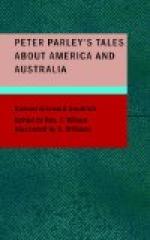But the admiral’s mind was bent upon discovering the supposed strait that was to lead to the Indian Ocean. In this navigation he explored a great extent of coast from Cape Gracios a Dios till he came to a harbour, which on account of its beauty and security, he called Porto Bello.
On quitting this harbour he steered for the south, and he had not followed this course many days when he was overtaken by storms more terrible than any he had yet encountered.
For nine days the vessels were tossed about at the mercy of a raging tempest. The sea, according to the description of Columbus, boiled at times like a cauldron, at other times it ran in mountain waves covered with foam: at night the raging billows sparkled with luminous particles, which made them resemble great surges of flame.
For a day and a night the heavens glowed like a furnace with incessant flashes of lightning, while the loud claps of thunder were often mistaken for signal guns of their foundering companions.
In the midst of this wild tumult of the elements, they beheld a new object of alarm. The ocean, in one place, became strangely agitated; the water was whirled up into a kind of pyramid or cone; while a livid cloud, tapering to a point, bent down to meet it; joining together, they formed a column, which rapidly approached the ship, spinning along the surface of the deep, and drawing up the water with a rushing sound, it passed the ship without injury.
His leaky vessels were not able to withstand storms like these. One of them foundered, and he was obliged to abandon another.
With the remaining two he bore away for Hispaniola, but in the tempest his ships falling foul of each other, it was with the greatest difficulty he reached the island of Jamaica.
His two vessels were in such a shattered condition, that, to prevent them from sinking, and to save the lives of his crews, he was obliged to run them on shore.
Having no ship now left, he had no means of reaching Hispaniola, or of making his situation known. In this juncture he had recourse to the hospitable kindness of the natives, who, considering the Spaniards as beings of a superior nature, were eager, on every occasion to assist them.
From them he obtained two canoes, each formed out of a single tree hollowed with fire. In these, which were only fit for creeping along the coast, two of his brave and faithful companions, assisted by a few Indians, gallantly offered to set out for Hispaniola; this voyage they accomplished in ten days, after encountering incredible fatigues and dangers.
By them he wrote letters to Ovando, describing his situation and requesting him to send ships to bring off him and his crews; but what will you think of the unfeeling cruelty of this man, when I tell you that he suffered these brave men to wait eight months before he would give them any hopes of relieving their companions: and what must have been the feelings of Columbus during this period.




